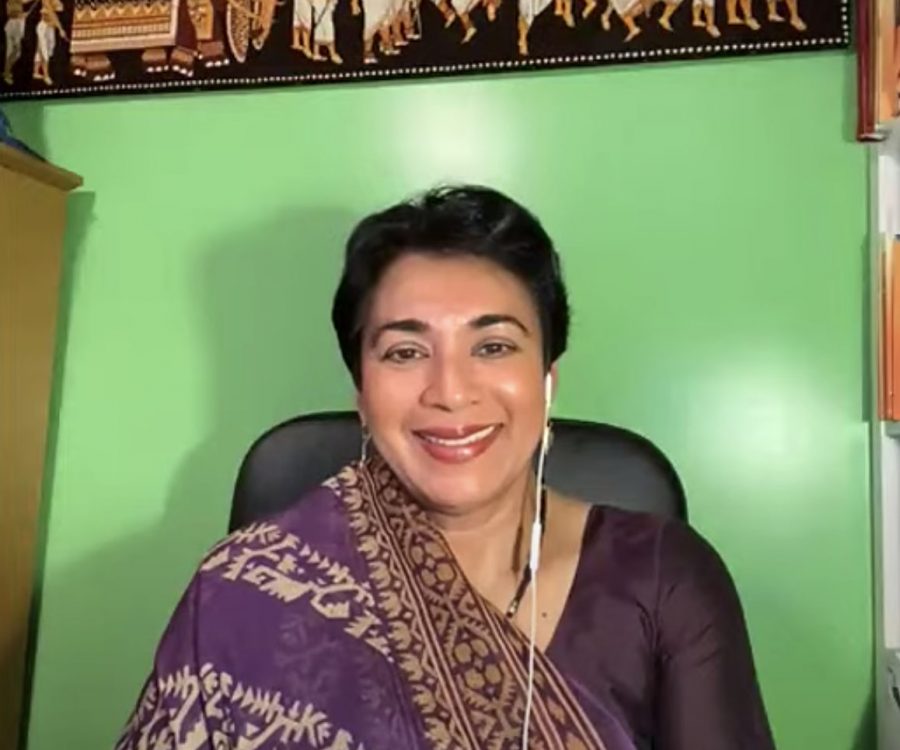Speaker discusses using meditation for emotional healing
A screen shot from the virtual lecture
Aruni Marapane, speaks in a virtual lecture in Oxford on Thursday, explaining how contemplating death can help people live well.
March 5, 2021
As a terminally ill mother of 12 received the news that her cancer was no longer treatable, Aruni Marapane recounted how she was beside her, holding her hand as she wept.
“The suffering was unfathomable, but the moment was so sacred. In that moment, I felt a divine presence,” Marapane reflected.
Marapane has held the hands of countless terminally ill and dying hospice patients in her 20-year career as a hospice caregiver, Buddhist chaplain and authorized meditation instructor. The mission of her caregiving practice is to ensure that every dying person is surrounded with love when they pass away.
In a virtual presentation, “Birth Sickness, Aging, Death and Meditation,” hosted Thursday night by Oxford’s Interfaith Center, Marapane shared how she discerned her calling for caregiving and the life lessons she has gained from those experiences.
Born in Sri Lanka, Marapane moved to the United States to practice law. While caring for her newborn son, she had time for soul searching.
“With law, something did not align. I have respect for the profession, but I lacked joy,” Marapane said.
Longing for her mother back home in Sri Lanka, she turned to prayer. Marapane recalled one prayerful moment that served as an epiphany.
“I thought, why does it have to be my mother? All human beings are mothers and fathers and sisters and brothers and daughters and sons. We are all one. It struck me as enlightening; it was an awakening,” Marapane said. She believes her whole caregiving journey started from that moment.
Marapane earned her Master of Gerontological Studies degree from Miami University. Through her studies, she visited nursing homes and instantly felt a connection with the residents.
“I felt so at home in those nursing homes and retirement communities. I felt so peaceful and welcomed. I learned how to take care of the elderly and aging and their physical and spiritual needs,” she recalled.
Marapane joined Hospice of Cincinnati and became a holistic caregiver. She practiced holistic care and later volunteered as a Buddhist chaplain. However, Marapane sought to deepen her relationships with patients.
“As a Buddhist chaplain, I did not have much time to understand my patients,” Marapane said.
In her new role as a patient care monitor, Marapane was now able to spend 12 hours with patients on a one-on-one basis. She cared for a triple amputee Iraq veteran, victims of sex trafficking, terminally ill cancer patients and other individuals in all kinds of life situations.
“Every patient was my object for meditation… I was able to do my meditations by confronting human suffering directly, by not running away from it,” she said.
Marapane’s relationships with dying patients inspired her to meditate on the impermanence and value of life. She learned that the way we frame our thoughts and our perception of death impacts both our mental and physical well-being.
“If we have negative thought patterns, the body creates sicknesses… If we contemplate death positively and constructively, we can live well,” Marapane said.
In daily meditations on our own immortality, Marapane encourages us not to dwell on materialism, but rather emphasize loving ourselves and those around us.
“Fill your hearts with love and compassion and confront suffering fearlessly. You’ll learn so much,” Marapane said.
Thursday’s public lecture was part of the Interfaith Center’s mission to bring together people from diverse secular, spiritual and religious traditions to foster an appreciation of diversity and understanding.














